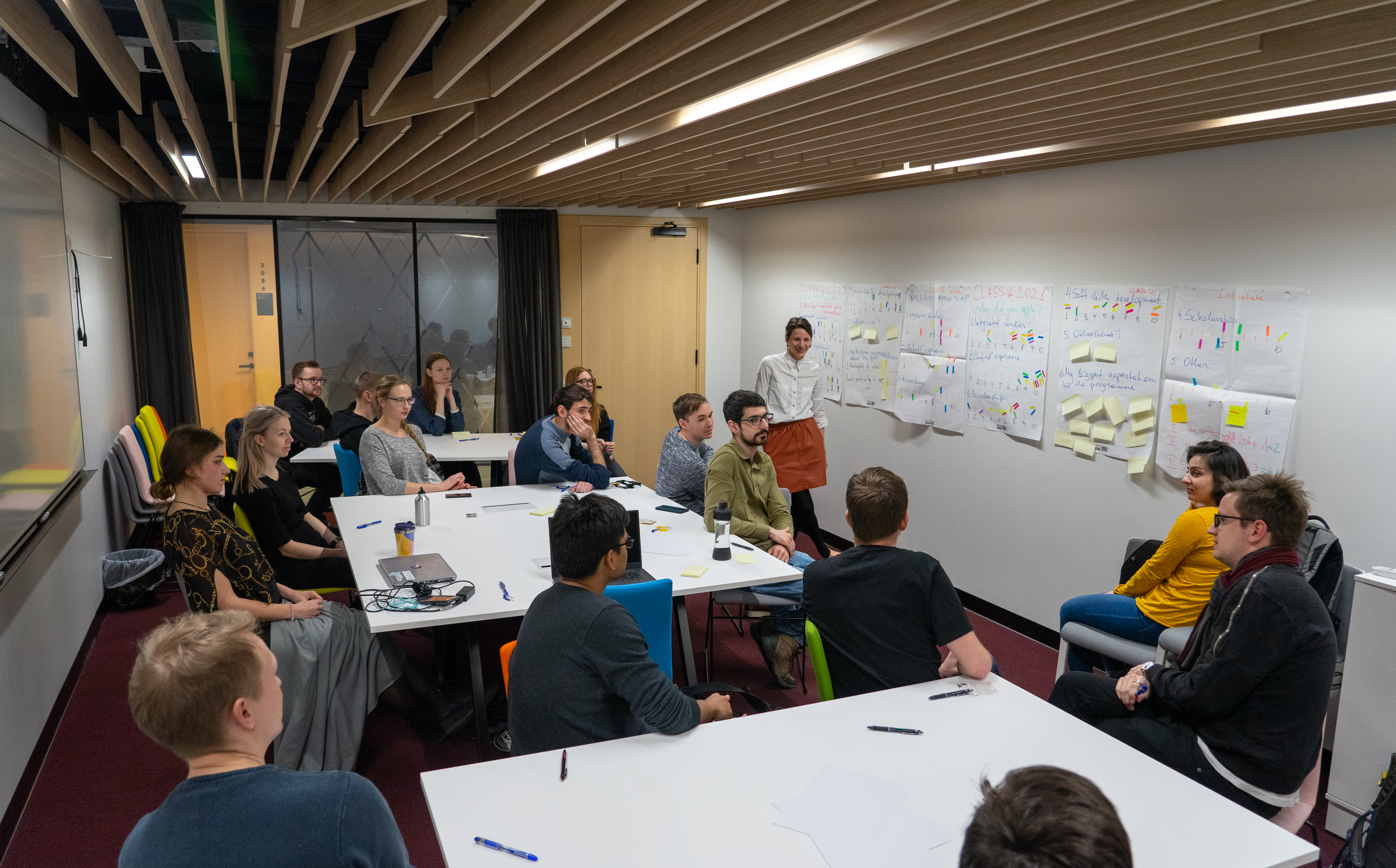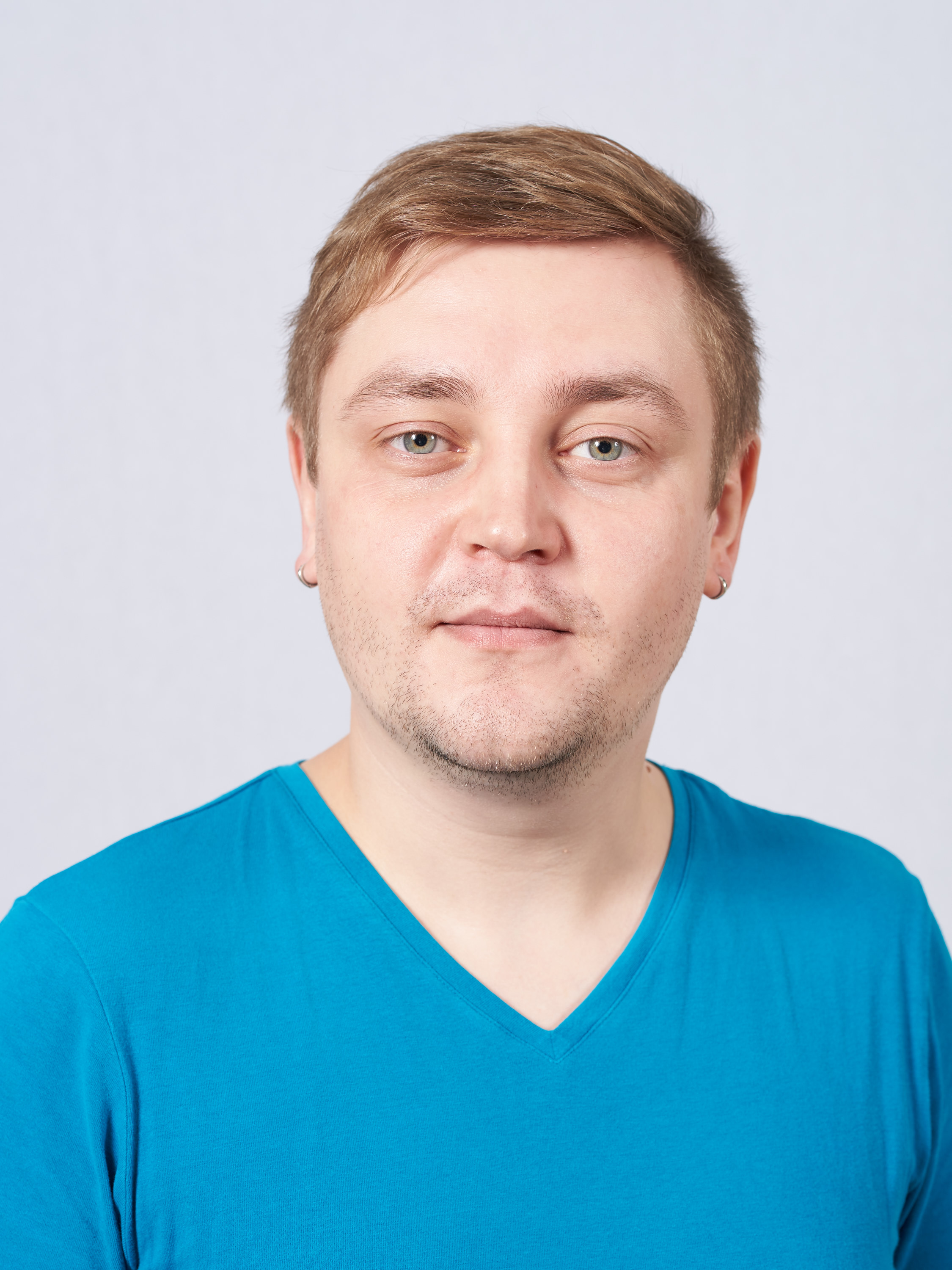Author: Phuong Nguyen
“High-performance computing (HPC) is the use of super computers and parallel processing techniques for solving complex computational problems. Nowadays, HPC plays an important role in the field of computational science, and are used for a wide range of computationally intensive tasks in various fields, including quantum mechanics, weather forecasting, climate research, oil and gas exploration, molecular modelling, and physical simulations.”
This summer, I had a great opportunity to participate in ISC High-Performance conference – the biggest event for the supercomputing community in European Union. The conference took place 24-28 of June in Frankfurt, Germany. Although it’s been a few weeks since it passed, I am still excited and want to share some points about it.
STEM student DAY & GALA
As the name suggests, this is the program for students from any disciplines regardless of the study level or experience in HPC. During the day, some tutorials were held to help students to have a basic knowledge in high-performance computing, supercomputer and how people use it in different research fields and industries. Those tutorials are easy to understand, even if you were not familiar with computer science. As a chemistry student, I did enjoy the “Introduction to High Performance Computing (HPC) Applications, Systems & Programming Languages” tutorial by Dr. Bernd Mohr. He explained to students the HPC terms by simple examples which are common in our life.
One more interesting part that provides more information about the emerging of HPC in the nearest decades is the keynotes of Prof. Thomas Sterling. His talk was attractive and full of humour, which helps students feel relaxing while acquiring essential knowledge. He also emphasized the important role of HPC not only in scientific researches but also in industrial innovations.
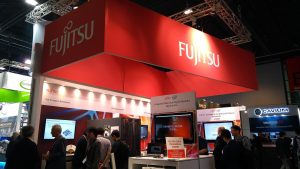
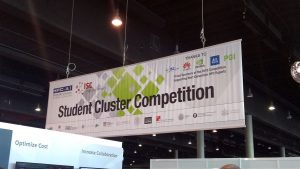
Pictures at exhibition area (credit: W.Lisan)
Besides the tutorials, students can also visit the exhibition area by themselves or in a group tour. Around 150 exhibitors ranging from HPC vendors, research laboratories, European projects and international universities showcased their new products. If you are into high-tech computer devices, this is your paradise. You can test them, talk to the technical teams and receive some gifts from the beloved company as well. For me, I had a feeling that I was lost in the sci-fi universe while walking around there.
One of the most incredible parts of this day is the Gala dinner. Besides enjoying delicious foods and drinks, this was a great chance to talk to other students who are also interested in HPC and networks for the future. I learned so much while listening to other students’ stories about their interested topics and their works. Some were also willing to share their experiences in pursuing the higher degree, doing an internship or gaining a higher position. Additionally, a small job fair is held at this dinner where students can look for a job in tech.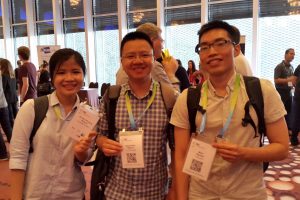
Phuong met new friends at Student GALA
Student volunteer
There is also another way for students to get to know more about High Performance Computing field by applying as a student volunteer. Student volunteer at ISC will get free pass to join the whole conference while helping at the conference. The organizer also provided the accommodation and lunch during the conference. It is also a great chance to meet other students from all around the world that have same interest. One of the Computer Science student from UT, Radita Liem, joined the student volunteer program this year.
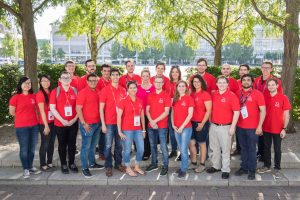
Student volunteer program
Presenting My Work at Women in HPC workshop
As a freshman, I had never thought that I would have a chance to present my work at a “real” workshop. This was also the main reason to bring me to the ISC18 (ISC 2018). In the second semester at UT, I took the course named ”Scientific Infrastructure Computing”. The lecturer recommended me making a poster as my final project for this course and sending it to the Women in HPC workshop – ISC18 and I was accepted. Then I had a lightning talk and poster presentation there.
My project was “Parallel password cracker”. This work aimed to help people have insights into information security and how HPC was used in the cracking process, then could consider safer passwords. I also had a mentor from WHPC who helped me improves the poster by discussing the poster reviews and providing advice on making revisions.
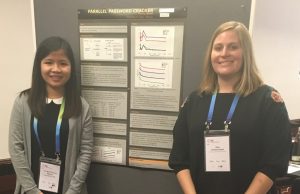 Phuong and her mentor Elsa Gonsiorowski from LLNL
Phuong and her mentor Elsa Gonsiorowski from LLNL
As the presentation day approached, I was a little worried since this was the first time I talked in front of many experts, researchers and international students. Thanks to the encouragement of the people there and supports from my mentor, everything was fine eventually. Besides introducing the activities of the woman in HPC all over world, this workshop provided me with more aspects of the research career, some challenges everyone can meet at work, especially for women and equip me with the skills to deal with it. This is an extremely useful thing for the young researcher like me and it helps me to feel more confident to pursue scientific work in the future.
Student cluster competition
Every year, 12 teams of students around world will come to ISC for 3-day competition. The main task is building small computing clusters (supercomputer) for a challenge to measure how fast it can be used to complete scientific HPC workloads. Several simulations from chemistry, physics and biology are run on these machines as well. I met some amazing teams at ISC18 – Student cluster competition and was impressed by Friedrich-Alexander University Erlangen–Nürnberg team from Germany. Their cluster reached 51.56 TFlops under 3000W limit. Having come back from ISC, I decided to call for a team from UT to participate in the next year competition. The team would have some challenging practice and training to have the best preparation. One spot is still available for a passionate person.
These are some interesting things I have gained from ISC18, if you are also interested in the supercomputer and want to challenge yourself in a new field – HPC, I recommend you taking some relative courses, including parallel computing, cloud computing, programming, numerical methods and computational sciences which are offered in Institute of Computer Science, Mathematics, Technology, Physics and Chemistry.
Once you are ready, seize your chance to participate in ISC19 next summer!
I would like to acknowledge Radita Liem, Thai Nguyen, Vlad Tuvoz for bits of help when I wrote this blog.If you are interested to join the Student cluster competition 2019, don’t hesitate to contact me: phuong.nguyen@ut.ee
I’m grateful to the Institute of Computer Science for the travel reimbursement.
